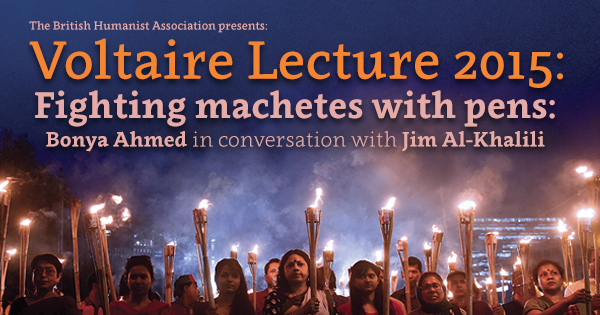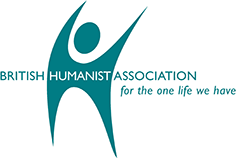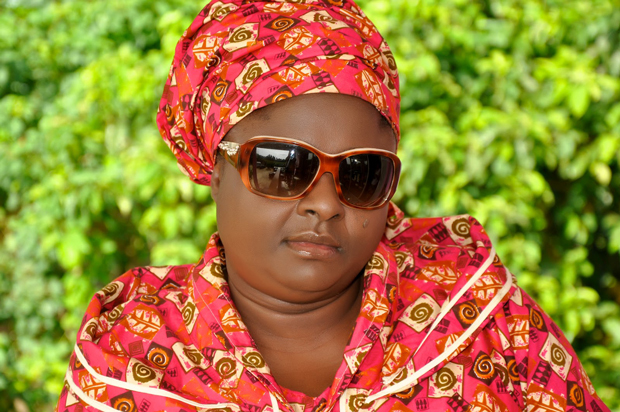31 May 2015 | Events

On 26 February this year, Bonya Ahmed and her husband Avijit Roy, both humanist bloggers, were visiting the national book fair of Bangladesh. Just outside Dhaka University, they were attacked with machetes by Islamic fundamentalists. Ahmed was severely wounded and Roy himself was killed.
In the British Humanist Association’s 2015 Voltaire Lecture, Ahmed will make her first public appearance since her husband’s murder to speak about her life with Roy and their struggle for humanism and secularism in Bangladesh and elsewhere.
Although shaken, Ahmed has sworn to continue the struggle against censorship and violence. She recognises her husband’s murder as “a crime not only against a person, but against freedom of speech and humanity”, and she is determined that those behind the attack do not succeed.
Hosted by BHA President Jim Al-Khalili.
When: Thursday 2nd July, 7:30pm (doors 7:00pm)
Where: Hilton London Metropole Hotel, W2 1JU (nearest tube Edgware Rd)
Tickets: £9 (Index supporters eligible for BHA member rate). Book here.
Presented by

4 Sep 2014 | News, Nigeria, United Kingdom

Lady Apostle Helen Ukpabio was banned from travel to the UK in April 2014
Lady Apostle Helen Ukpabio is a pastor, author, film producer, actress, artist, composer and singer and founder of Liberty Foundation Gospel Ministries, based in Calabar, Nigeria. She is also, as one would suspect of someone with such a CV, possessed of admirable chutzpah.
It emerged this week that Ukpabio is threatening to sue the British Humanist Association to the tune of half a billion pounds (to be precise, £500,010,500 in costs and compensation). Ukpabio claims that the BHA, and their companions at the Witchcraft and Human Rights Information Network, have defamed her. Her specific claim against the BHA is that an article on its website claimed she believed that noisy babies may be possessed by Satan.
The article, which appeared in July 2009, says that Ukpabio wrote in her book, Unveiling The Mysteries Of Witchcraft, that “A child under two years of age that cries at night and deteriorates in health is an agent of Satan”.
In this, the article is mistaken. Ukpabio’s book does not seem to contain this sentence. Rather, under the heading “How To Recognise A Witch”, Ukpabio writes: “Under the age of two, the child screams at night, cries, is always feverish suddenly deteriorates in health, puts up an attitude of fear, and may not feed very well.”
This is not, you will see, the same. But a misquote is one thing; a libel is quite another.
The placing of this misquote at the centre of Ukpabio’s claim is based on the premise that it is fundamentally worse to accuse a child of being possessed by a devil than it is to accuse a child of being a witch, or possessed by a witch, or a vampire (as mentioned in the initial legal threat).
This is the stuff of a particularly heated thread on a Dungeons and Dragons board. It is not an argument that has a place in a chamber at the Royal Courts of Justice, in spite of that building’s Gormenghastish architecture.
That’s not the only reason the case shouldn’t come to court: the article in question was published over five years ago, apparently without ill effect on the lady Ukpabio. She admits to not having seen the article on the BHA website until earlier this year.
Her complaint, in reality, is not about the 2009 article, or the difference between satanic possession and witchcraft. Ukpabio’s underlying complaint is about a campaign to have her banned from the country in April 2014. It is the coverage of her controversial trip to Britain in April that her lawyer claims caused her to suffer reputational injury.
So why, rather than attack the numerous news outlets who reported negatively on her UK visit, during which a London venue cancelled her booking after being alerted to her witchfinding and exorcising activities, is she instead pursuing threatening humanists?
At the World Humanist Congress in Oxford last month, Nigerian delegates such as the brilliant, brave Leo Igwe, spoke passionately about preachers and witchfinders like the Lady Apostle. While in Britain “militant atheist” has become a term of abuse associated with the gauche tweets of Professor Richard Dawkins, in Nigeria, a forthright approach to religion and the abuses carried out in its name is a necessity. Humanists there are not fighting semantic battles; rather, they are engaged in a real struggle to save children and vulnerable people from accusations of witchcraft and possession: accusations that could lead to them being thrown out of their homes, beaten and even killed.
What scant support Nigerian activists receive comes from the international atheist and humanist community. While I would not cast doubt on western humanists’ solidarity with their Nigerian comrades, a costly court case would make anyone think twice before getting involved in faraway struggles again.
To grant Ukpabio’s claim any credence would be to severely inhibit the struggle against dangerous superstitions in Nigeria and elsewhere in Africa. To even get involved in an legal argument over whether satanic possession is worse than witchcraft would grant a glimmer of legitimacy to the abuse of children in the name of God. That is reason enough for the English High Court to dismiss the Lady Apostle’s ludicrous lawsuit.
This article was posted on Sept 4, 2014 at indexoncensorship.org
8 Mar 2011 | Uncategorized
There will be two billboards in London this month – at Angel and in Hammersmith – displaying the slogan of the British Humanist Association Census Campaign: “If you’re not religious, for god’s sake say so”. Other than online, those two billboards are the only place you are likely to see that slogan, which this week should have been visible on railway stations and on the sides of buses in Manchester, Leeds, Liverpool, Birmingham, Cardiff, Exeter and other towns and cities across England and Wales.

The hundreds of other posters supposed to be appearing across the country this week have been prevented from appearing in case they cause offence.
Bus posters with the phrase “for God’s Sake” were turned down by the owners of the space on buses because of the advice of the Committee of Advertising Practice (CAP) that, under 4.1 of its code, the phrase “for God’s sake” had the potential to cause “widespread” and “serious” offence. We had to amend the slogan to get the bus posters out there.
Posters bearing the slogan intended for railway stations were rejected by the owners of the space for same reason, but the companies owning the space went further and said that, in any case, they didn’t want to take adverts relating to religion. So, we were allowed no posters at railway stations at all.
This sorry episode raises two serious questions about advertising in a free society.
Firstly, how is offence to be measured? We received emails at the office from Christians who weren’t offended by our slogan and at least two Christians I discussed the issue with on radio said the same thing. On what grounds did CAP believe that offence at our slogan would be “widespread”? And what would make that offence – taken in response to a common idiomatic phrase as thoroughly secularised as Christmas – so “serious”? And why did the owners of the railway station spaces shy away from our posters when posters from the Trinitarian Bible Society saying that anyone who doesn’t believe in god is a “fool” are a perennial part of my daily commute? Is offence only serious if people who believe in a god feel it?
The second question is, although we all know that the ASA is responsible for dealing with complaints about adverts once they are up, who is responsible for deciding whether an advert gets up in the first place?
Especially in an area as sensitive as censorship, simple principles of the rule of law would demand that any regulations should be clear, accessible and universally applied and that, in the event of a decision being made, it is clear who has made it, why they have, and how it can be appealed. In our situation, this was all impossible. Both parties – CAP and the owners of the advertising space – were able to place responsibility for the censorship of the adverts on the other.
CAP advised that our adverts could break the code. Owners of the advertising space said they would not take adverts that CAP had advised could break the code. We could not appeal against the advice of CAP because it is non-binding and CAP said it was entirely up to the owners of the space whether to take our adverts. The owners of the space said they would not go against advice from CAP. We could not appeal against them because they are commercial interests perfectly free to refuse any adverts they care to.
If public advertising space becomes increasingly concentrated in fewer hands, there is every reason to fear that what we see will be only what unaccountable and (naturally) offence-shy commercial interests will allow us to see. In this situation, a more suitable role for a regulator than sniffing out offensive potential would be to advance and guarantee free expression against such interests, for all our sakes.
Andrew Copson is chief executive of the British Humanist Association




